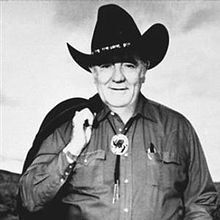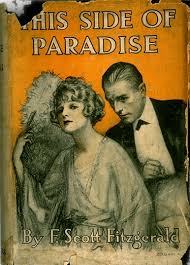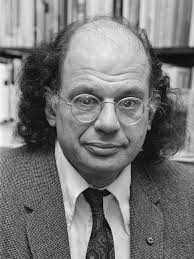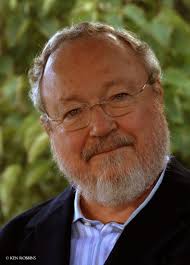If your birthday is today Gentle Readers, I suggest you write that masterpiece you have been dreaming of because you share a birthday with two highly successful and prolific writers.
 Our first author of the day came to us in 1908 from Jamestown, North Dakota. Louis L’Amour was the seventh son of a local veterinarian, politician, and farm equipment broker. Louis grew up with an avid love of reading born from extensive time spent in the library. Though he left school at age 15, Louis went on to try his hand at many careers. After World War II, he sat down to seriously try his hand as a writer. He drew from his own personal experience, as well as extensive research, to craft realistic and historically accurate novels that would launch his career. His short story, The Gift of Cochise, was read and loved by John Wayne. Wayne would purchase the screen rights and the character Hondo Lane was born. In all, Louis has over 100 novels, 250 short stories, and many poetry collections to his credit. His work is still in print and sales topped well over 200 million before his death to lung cancer in 1988.
Our first author of the day came to us in 1908 from Jamestown, North Dakota. Louis L’Amour was the seventh son of a local veterinarian, politician, and farm equipment broker. Louis grew up with an avid love of reading born from extensive time spent in the library. Though he left school at age 15, Louis went on to try his hand at many careers. After World War II, he sat down to seriously try his hand as a writer. He drew from his own personal experience, as well as extensive research, to craft realistic and historically accurate novels that would launch his career. His short story, The Gift of Cochise, was read and loved by John Wayne. Wayne would purchase the screen rights and the character Hondo Lane was born. In all, Louis has over 100 novels, 250 short stories, and many poetry collections to his credit. His work is still in print and sales topped well over 200 million before his death to lung cancer in 1988.
 Our second author of the day is one I am sure that most readers know, whether they love him or hate him. James Patterson, prolific writer and philanthropist, was born on this day in 1947 in Newburgh, New York. No one can refute that Patterson is wildly successful. His critics, who include Stephen King, are critical of his abilities as a writer because of the number of co-authored books he has published. My understanding is that all of his co-authors are provided detailed outlines, and he revises all chapters himself anyway. Personally, I saw go for it, as long as he is giving credit to his co-authors. I wouldn’t turn him down if he wanted to collaborate on a project. So, if you are reading this James, drop me an email and let’s chat about our next project, OK?
Our second author of the day is one I am sure that most readers know, whether they love him or hate him. James Patterson, prolific writer and philanthropist, was born on this day in 1947 in Newburgh, New York. No one can refute that Patterson is wildly successful. His critics, who include Stephen King, are critical of his abilities as a writer because of the number of co-authored books he has published. My understanding is that all of his co-authors are provided detailed outlines, and he revises all chapters himself anyway. Personally, I saw go for it, as long as he is giving credit to his co-authors. I wouldn’t turn him down if he wanted to collaborate on a project. So, if you are reading this James, drop me an email and let’s chat about our next project, OK?
Either of these authors make great role models for hard work and perseverance. Their dedication to the craft of storytelling is legendary. Happy Birthday to them both today.
Make your own legends my Gentle Readers. Be the L’Amour or Patterson of whatever it is you want to do in life. Be it writing related, or just the best in your chosen field. Until next time. Live well, write well, be well.





 Thomas Harris was born this day in 1940 in the town of Jackson, Tennessee. He would move as a child to Mississippi. Thomas is famous for creating the iconic connoisseur of human flesh, Hannibal Lector. Like his creation, Harris is a fantastic chef and purveyor of fine wines. He has even taken the grueling Le Cordon Bleu exams. Not much else is known about this supremely private storyteller, as he has not granted an interview since 1976 and avoids publicity like the plague.
Thomas Harris was born this day in 1940 in the town of Jackson, Tennessee. He would move as a child to Mississippi. Thomas is famous for creating the iconic connoisseur of human flesh, Hannibal Lector. Like his creation, Harris is a fantastic chef and purveyor of fine wines. He has even taken the grueling Le Cordon Bleu exams. Not much else is known about this supremely private storyteller, as he has not granted an interview since 1976 and avoids publicity like the plague. Our first author of the day came to us in 1908 from Jamestown, North Dakota. Louis L’Amour was the seventh son of a local veterinarian, politician, and farm equipment broker. Louis grew up with an avid love of reading born from extensive time spent in the library. Though he left school at age 15, Louis went on to try his hand at many careers. After World War II, he sat down to seriously try his hand as a writer. He drew from his own personal experience, as well as extensive research, to craft realistic and historically accurate novels that would launch his career. His short story, The Gift of Cochise, was read and loved by John Wayne. Wayne would purchase the screen rights and the character Hondo Lane was born. In all, Louis has over 100 novels, 250 short stories, and many poetry collections to his credit. His work is still in print and sales topped well over 200 million before his death to lung cancer in 1988.
Our first author of the day came to us in 1908 from Jamestown, North Dakota. Louis L’Amour was the seventh son of a local veterinarian, politician, and farm equipment broker. Louis grew up with an avid love of reading born from extensive time spent in the library. Though he left school at age 15, Louis went on to try his hand at many careers. After World War II, he sat down to seriously try his hand as a writer. He drew from his own personal experience, as well as extensive research, to craft realistic and historically accurate novels that would launch his career. His short story, The Gift of Cochise, was read and loved by John Wayne. Wayne would purchase the screen rights and the character Hondo Lane was born. In all, Louis has over 100 novels, 250 short stories, and many poetry collections to his credit. His work is still in print and sales topped well over 200 million before his death to lung cancer in 1988. Our second author of the day is one I am sure that most readers know, whether they love him or hate him. James Patterson, prolific writer and philanthropist, was born on this day in 1947 in Newburgh, New York. No one can refute that Patterson is wildly successful. His critics, who include Stephen King, are critical of his abilities as a writer because of the number of co-authored books he has published. My understanding is that all of his co-authors are provided detailed outlines, and he revises all chapters himself anyway. Personally, I saw go for it, as long as he is giving credit to his co-authors. I wouldn’t turn him down if he wanted to collaborate on a project. So, if you are reading this James, drop me an email and let’s chat about our next project, OK?
Our second author of the day is one I am sure that most readers know, whether they love him or hate him. James Patterson, prolific writer and philanthropist, was born on this day in 1947 in Newburgh, New York. No one can refute that Patterson is wildly successful. His critics, who include Stephen King, are critical of his abilities as a writer because of the number of co-authored books he has published. My understanding is that all of his co-authors are provided detailed outlines, and he revises all chapters himself anyway. Personally, I saw go for it, as long as he is giving credit to his co-authors. I wouldn’t turn him down if he wanted to collaborate on a project. So, if you are reading this James, drop me an email and let’s chat about our next project, OK?


